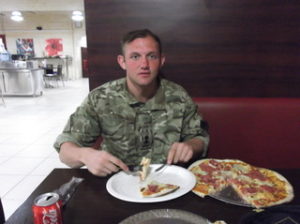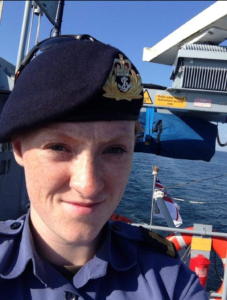Transitioning from the Armed Forces to “civvie street” pushes you out of your comfort zone – I know from experience. These days there’s an abundance of free advice and resources available to help service leavers navigate the plethora of civilian jobs on offer. But if, as I did, you want to explore a career off the beaten path – like in the world of startups – it can be more challenging to find useful guidance. How do military operations translate to civvie street?
I spoke to three former military officers from the British Army, the Royal Navy and the Royal Air Force (learn about them below). Since hanging up their boots, they’ve each pursued unique and fulfilling careers in the startup space. I asked them what they’ve learned from making that bold career change – good and bad, about startups and the military – and what advice they’d give someone looking to follow in their footsteps.
If you’re leaving the military and considering a career in startup operations, here’s everything you need to know – as experienced by veterans who’ve made that change successfully. Even if you’re not a service leaver, you’ll benefit from their fascinating insights about operations management, organisational culture and leadership. Listen in!
1) What did you find challenging about your transition from the military to startup operations?
“a CEO wandering around in shorts was a real culture shock”
Will, ex-Army: There are no “Part 1 Orders” to tell you what’s happening on a day-to-day basis, and no-one to tell you what to do – or more importantly how to do it. The great thing is that this is because no-one knows what to do. It’s never been done before and you have to work it out for yourself, which is of course great fun. It’s not easy and you constantly feel out of your depth, but that probably shows you’re doing it right.
Zoë, ex-Navy: The biggest change was an absence of hierarchy. It’s taken me a long time to get over the military and become acclimatised to flatter structures. But it’s refreshing to operate in a world where “the best idea wins”.
Kofi, ex-RAF: Ridiculously I found the lack of command structure really hard to deal with. I was used to taking orders, understanding my commander’s intent and cracking on. A lot of the safety rails were removed when I joined a startup. There wasn’t always a clear mission, goals or things to tick off. There was a very strong sense of purpose but that was kind of it. The structures were all made of jelly. Even the change from my old commanding officer to a CEO wandering around in shorts asking me what I thought was a real culture shock.
2) Which aspects of your military experience helped you transition from the military to startup operations?
“The ability to dig deeper, keep smiling and get on with it”
Will, ex-Army: Resilience is very important. Startups are hard work and you have to believe in what you’re doing and that it’s worth it. The ability to dig deeper, keep smiling and get on with it is so important to getting new businesses going.
Zoë, ex-Navy: It sounds clichéd but “no plan survives contact with the enemy” and “prior preparation prevents poor performance” are two mantras I continue to swear by. Applying both of these to the business setting has enabled me to seem credible – granted I might have to do extra homework – and flexible and adaptable to rapidly changing startup environments.
Kofi, ex-RAF: Two big bits for me –
1. Leadership. Very few people have received training on leadership and management. They have a lot of ideas about what this is but very few have had the level of training and experience most in the military take for granted. When joining startups the biggest thing I see ex-mil people bring is the understanding that the troops come first. How important it is to make people a brew and offer them a biscuit and that interest in getting to know why people come to work and what they want to achieve. It’s the kind of stuff you just do in the military but it really makes a difference to people.
2. Planning. If things go wrong people won’t be shot. It’s really nice to bring some military level planning and perspective to things. When things go wrong you can be the calm person in the corner figuring out what to do; helping the teams. Mainly because you’ve seen worse things and know that afterwards people will remember the kind of leadership you showed when the chips were down. To that end planning and already knowing the worst case scenario is critical. Whichever service you come from the planning is based on several layers of “so what?” It’s really easy to fall back on something when you have training and and a plan. Really, it makes you look much better than you actually are.
3) How could startups run operations better, based on your experience in the military?
“Startups should be sure to put strong leaders at their helm”
Will, ex-Army: Don’t plan too far in advance. The pace of change means the old adage “if you plan early, you plan twice” is just as true in startups as it is in the military. Have an idea of where you want to get to and react to events as they unfold to create short, lightweight planning cycles. It goes without saying that you shouldn’t get attached to these plans as they will not survive first contact with the market.
Zoë, ex-Navy: The military is generally good at investing in their people – through the holistic line management structure – and empowering people with responsibility. I’ve found a vacuum of good startup leaders who value feedback and take the time to nurture and grow their teams. Startups, while scrappy in their nascent days, should be sure to put strong leaders at their helm (yes, I’m from the Navy!)
Kofi, ex-RAF: Spend a bit more time thinking about what you’re trying to solve and why. People become fixated on doing certain things but seldom return to the plan or question why this was important. The pause and ability to question things to get to the root cause is fun and something you see from companies and people that really fly.
Also remember you can have the worst tools and the worst plan but the best people and win. Committing to people and rewarding them is something that can really make the difference. I think in the military we’re used to making things work with none of the resources we wish we had. You get through that by being a team and caring. Sometimes you see startups forget this. They spend all their time planning and not thinking about what happens when the plan hits first contact. Or whether people will happily follow the plan.
4) How could the military run operations better, based on your experience in startups?
“Exploring novel ideas would allow the military to innovate”
Will, ex-Army: The military has a long way to go in thinking about how it can harness technology at all levels. I am admittedly out of date but the toil involved in many processes – on ops, on exercise and in barracks – could be made infinitely more efficient by embracing technological innovations.
Zoë, ex-Navy: Getting over the “because we’ve always done it like this” mindset – it’s not a valid reason. The military should allow and encourage people to challenge those opinions, in a safe manner, in order to evolve. Exploring novel ideas, regardless of who comes up with them, would allow the military to innovate.
Kofi, ex-RAF: I think a very prescribed promotion system is great for the military but I wonder how many people churn because it’s too slow for them. Or, they can’t progress because they’re deemed to lack military bearing. It places a lot of emphasis on a prescribed idea of success, which stifles creativity. It’s more difficult to break out and say what you really think. You do see the Forces try to adapt with the new recruitment campaigns. I just wonder whether they’ve slightly missed the point. You aren’t just trying to convert gamers you’re trying to bring in people that think and see the world differently.
5) What advice would you give to someone leaving the military and looking to work in startup operations?
“New career paths can open up in unexpected places”
Will, ex-Army: Keep one eye on the technology side of the business. In ops you’ll quickly become a subject matter expert and have an idea of what technology should be built. Product teams highly value p and new career paths can open up in unexpected places.
Zoë, ex-Navy: Translating your experience to the real world is vital. A hiring manager is going to take a risk on hiring you, so you need to give them the confidence you’re worth them putting their neck on the line. Money, time and outcomes are what they care about – help them understand what you can bring to their organisation.
Kofi, ex-RAF: Figure out what you want to do and why. It’s easy to find purpose in the startup community. It is great and the closest I’ve got to recreating the old feeling of military camaraderie. But ask yourself if this is what you really want. It isn’t easy and you won’t walk into a role at the same level as if you go via the more well trodden paths. To begin with you’ll be able to earn more doing virtually anything else, so spend some time talking to friends in startups to figure out what’s driving you down this path. I wouldn’t swap it for the world but it isn’t a relaxing life and has taken what little hair I have remaining.
About our ex-military career advisors
William Perkins was a captain in the Royal Horse Artillery. Following a master’s in international relations he joined his first startup Deliveroo, where he progressed through a number of operations management roles before retraining as a product manager.


Zoë Williams was a warfare officer in the Royal Navy. She held operations and product management roles at her first startup Deliveroo, alongside competing as an Invictus Games athlete. She is currently a business development manager at Palantir Technologies.


Kofi Barnes was an aerospace battle manager in the Royal Air Force. Following a stint in mine clearance he held operations and product management roles at startups onefinestay, Deliveroo, Kano Computing and Zego. He is now chief of staff at Chill-Chain.

